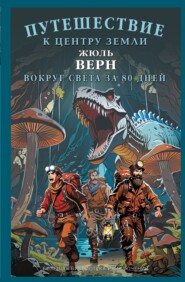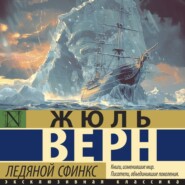По всем вопросам обращайтесь на: info@litportal.ru
(©) 2003-2024.
✖
Двадцать тысяч лье под водой / Twenty Thousand Leagues Under the Sea
Настройки чтения
Размер шрифта
Высота строк
Поля
And now, what were Ned Land’s views on this question of a marine monster? I must admit that he flatly didn’t believe in the unicorn, and he didn’t share the general conviction.
Three weeks after our departure we had crossed the Tropic of Capricorn, and the Strait of Magellan opened less than 700 miles to the south. Seated on the afterdeck, Ned Land and I chatted about one thing and another, staring at that mysterious sea whose depths to this day are beyond the reach of human eyes.
“Ned,” I asked him, “how can you still doubt the reality of this cetacean? Do you have any particular reasons for being so skeptical?”
The harpooner stared at me awhile before replying, closed his eyes as if to collect himself, and finally said:
“Just maybe, Professor Aronnax.”
“But Ned, you’re a professional whaler, a man familiar with all the great marine mammals—your mind should easily accept this hypothesis of an enormous cetacean!”
“That’s just where you’re mistaken, professor,” Ned replied. “The common man may still believe in fabulous comets crossing outer space, or in prehistoric monsters living at the earth’s core, but astronomers and geologists don’t swallow such fairy tales. It’s the same with whalers. I’ve chased plenty of cetaceans, I’ve harpooned a good number, I’ve killed several. But no matter how powerful and well armed they were, neither their tails or their tusks could puncture the sheet-iron plates of a steamer.”
“Listen to me, Ned—”
“No, no, professor. Some gigantic devilfish maybe…?”
“Even less likely, Ned. The devilfish is merely a mollusk. Even if it were 500 feet long, it would still be utterly harmless to ships like the Abraham Lincoln.”
“So, Mr. Naturalist,” Ned Land continued in a bantering tone, “you believe in the existence of some enormous cetacean?”
“Yes, Ned, I repeat it. I believe in the existence of a mammal with a powerful constitution, and armed with a tusk made of horn that has tremendous penetrating power.”
“Humph!” the harpooner shook his head.
“Note well,” I went on, “if such an animal exists, if it lives deep in the ocean, it needs to have a constitution so solid, it defies all comparison.”
“And why this powerful constitution?” Ned asked.
“Because it takes incalculable strength just to live in those deep strata and withstand their pressure.”
“Oh really?” Ned said.
“Oh really, and I can prove it to you with a few simple figures.”
“Oh!” Ned replied. “You can make figures do anything you want!”
“In business, Ned, but not in mathematics. Listen to me. If such animals don’t exist, my stubborn harpooner, how do you explain the accident that happened to the Scotia?”
“It’s maybe … ,” Ned said, hesitating.
“Go on!”
“Because … it just couldn’t be true!” the Canadian replied.
But this reply proved nothing. That day I pressed him no further. The Scotia’s accident was undeniable. Its hole was real enough, and I don’t think a hole’s existence can be more emphatically proven. This hole didn’t make itself, and since it hadn’t resulted from underwater rocks or underwater machines, it must have been caused by the perforating tool of some animal.
Chapter 5
Near three o’clock in the afternoon on July 6, fifteen miles south of shore, the Abraham Lincoln doubled that solitary islet at the tip of the South American continent. Our course was set for the northwest, and the next day our frigate was in the waters of the Pacific.
Day and night we observed the surface of the ocean. The weather was good. Our voyage was proceeding under the most favorable conditions. July in this zone corresponds to our January in Europe; but the sea remained smooth and easily visible.
Ned Land spent eight hours out of every twelve reading or sleeping in his cabin. A hundred times I chided him for his unconcern.
“Bah!” he replied. “Nothing’s out there, Professor Aronnax, can’t you see we’re just wandering around at random? People say they’ve seen this slippery beast again in the Pacific seas—I want to believe it, but two months have already gone by since then! So if the beast does exist, it’s already long gone!”
I had no reply to this. Obviously we were just groping blindly. But how else could we go? Our chances were pretty limited. Yet everyone still felt confident of success.
We were finally in the area of the monster’s latest activity! The entire crew suffered from a nervous excitement that it’s beyond me to describe. Nobody ate, nobody slept. A reaction was expected to follow.
And this reaction wasn’t long in coming. For three months, during which each day seemed like a century, the Abraham Lincoln plowed all the northerly seas of the Pacific. And we found nothing!
At first, discouragement took hold of people’s minds, opening the door to disbelief. The crew called themselves “out-and-out fools”. With typical human fickleness, they jumped from one extreme to the other. Inevitably, the most enthusiastic supporters of the undertaking became its most energetic opponents.
And this futile search couldn’t drag on much longer. The Abraham Lincoln had done everything it could to succeed and had no reason to blame itself. The crew weren’t responsible for this failure; there was nothing to do but go home.
The commander’s sailors couldn’t hide their discontent, and their work suffered because of it.
Commander Farragut asked for a grace period [17 - a grace period – отсрочка]of just three days more. After this three-day delay, if the monster hadn’t appeared, the Abraham Lincoln would chart a course toward the European seas.
This promise was given on November 2. It had the immediate effect of reviving the crew’s failing spirits. The ocean was observed with renewed care. Spyglasses functioned with feverish energy.
Two days passed. The ship stayed at half steam. A thousand methods were used to spark the animal’s interest or rouse it from its apathy.
At noon the next day, November 5, the delay expired. By then the frigate lay in latitude 31 degrees 15’ north and longitude 136 degrees 42’ east. The shores of Japan were less than 200 miles to our leeward. Night was coming on. Eight o’clock had just struck. Huge clouds covered the moon’s disk.
Just then I was leaning over the starboard rail. Conseil stared straight ahead. Observing Conseil, I discovered that, just barely, the gallant lad had fallen under the general influence. At least so I thought. Perhaps his nerves were twitching with curiosity for the first time in history.
“Come on, Conseil!” I told him. “Here’s your last chance to get $2,000!”
“If master will permit my saying so,” Conseil replied, “I never expected to win that prize, and the Union government could have promised $100,000 and been none the poorer.”
“You’re right, Conseil, it turned out to be a foolish business after all, and we jumped into it too hastily. What a waste of time! Six months ago we could have been back in France—”
“In master’s little apartment,” Conseil answered. “In master’s museum! And by now I would have classified master’s fossils.”
“Quite so, Conseil, and what’s more, I imagine that people will soon be laughing at us!”
Conseil didn’t have time to answer. A voice became audible. It was Ned Land’s voice, and it shouted:
“Ahoy! There’s the thing, abreast of us to leeward!”
Chapter 6
At this shout the entire crew rushed toward the harpooner—commander, officers, mates, sailors, cabin boys, down to engineers leaving their machinery and stokers neglecting their furnaces. The order was given to stop.
Ned Land was not mistaken, and we all saw the object his hand was indicating. Not far from the Abraham Lincoln, the sea was lit up from underneath. This was no mere phosphorescent phenomenon. The monster gave off that very intense but inexplicable glow that several captains had mentioned in their reports. This magnificent radiance had to come from some force with a great illuminating capacity.

















